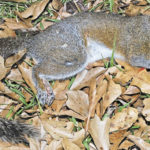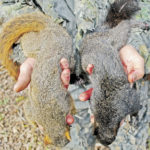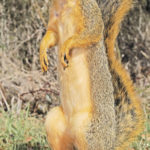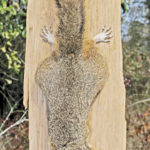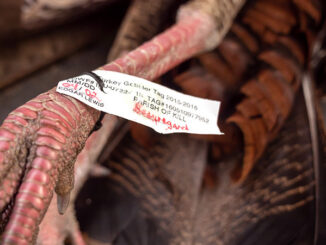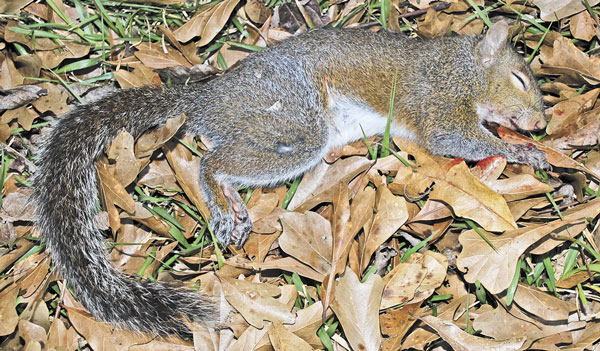
When you either kill squirrels or you don’t eat, you learn quickly how to be a master of the sport.
“I was the first person in my family to consider hunting a sport,” said 62-year old Charles Johnson. “People in my family hunted for food — for something to eat.”
Growing up in deeply rural areas on the Louisiana-Mississippi border, Johnson said that as a kid, his family lived on corn meal mush for days on end. And there were times they would run totally out of food.
“Momma, Vernon (his older brother) and I would grow a big garden, and Momma canned a lot, but sometimes we would just run out,” said Johnson matter-of-factly. “We saw game as food; all the poor country people did back then. But if you don’t have something and no one else around you has anything either, you don’t know you are poor.
“We didn’t know we were poor until Lyndon Johnson came along and told us we were,” he said with a sly grin.
More soberly, he said that the first time he really realized that his family was poor was when he went to the home of a town kid in Woodville, Miss., and looked in the pantry.
“Everything had labels on it,” he said. “I’d never seen anything like that. It couldn’t help but bother me a little.”
Johnson said that while the family always had electricity, they didn’t always have running water and a toilet, even an outdoor toilet. Until the fifth grade when older brother Vernon built the family an outhouse, the family went behind the bushes — literally.
“Daddy didn’t believe in them because he said they smelled too bad,” Johnson said.
The fifth grade also brought the family their first water well.
“Grampa made a homemade bit, and he and Vernon turned the drill pipe by hand with pipe wrenches to drill the well,” he said.
By the ninth grade, they had indoor water, piped to a single water faucet just inside the back door. Before that, the family got all their drinking and bathing water by bucket from a nearby natural spring.
“I skipped school a lot, even though I made straight A’s,” said Johnson with a twinkle in his green eyes.
Squirrels, rabbits and quail were the big game then, and it wasn’t unusual, he said, to jump four to six coveys of quail every time he hunted.
“There was no big game then — none, zero!” he said. “I didn’t even see a deer track in the hills until I was in my teens.”
Few people had rabbit dogs in those days, and the Johnsons didn’t either, so most of the rabbits they killed for food were taken at night.
“That was too easy,” Johnson said. “You could kill a rabbit almost anytime. Squirrels were my biggest challenge; they still are.”
The barefoot kid honed his hunting skills by stalking the family’s guinea hens to find their nests so he could rob the eggs for the family to eat.
“Try stalking a guinea,” he said proudly. “If a guinea knows you are following it, it will fool you every time. I’ve followed ’em long enough that they finally just gave up and laid an egg on the open ground.”
From there, he began stalking blue jays and crows to see how close he could get. With his slingshot, and marbles he won at school as ammo, he killed lots of robins and black birds for the supper table.
“Redbirds and English sparrows were good too,” he said, “but meadowlarks are the stringiest things in the woods. Momma even tried cooking a crow once. I tried it,” he grunted. “It was tough.”
His real hunting started at age 11 with an ancient 20-gauge crack-barrel shotgun. With every shot, the forestock would fly off, and he would have to reassemble it. He used the cheapest shells available — low-brass Peters Victor, at a grand $1 a box.
“Those shells weren’t real powerful, so I had to get close to make a good shot,” he said. “A big Bachman’s fox squirrel can carry a lot of lead.”
Squirrels became Johnson’s favorite target, as well as his favorite wild game to eat. And squirrels, along with quail, remain his favorites today.
“We chicken-fried the young ones, and cooked the tough older squirrels in an onion gravy,” he said.
Everything got eaten, including the heads.
“In fact, the heads are the best part,” he said. “We never threw the heads away.”
With gusto, he elaborated.
“After you get all the good meat off the cheeks, and you pluck out the tongue and eat it, then you crack open the head and eat the brains.
“Funny thing was that we never ate rabbit heads. I don’t know why. Figure that out. But we ate chicken heads and feet. The feet we boiled and skinned. Then we fried them and gnawed the gristle off.”
Although squirrels were a favored target, Johnson passed over very little in the woods that was edible.
“We didn’t see many coons, so I was tickled when I got one,” he said. “It was a big hunk of meat.”
“We picked up dead coons many a time on the road too. You could tell if they were still good. If they were still limp and warm, they were good. Before Welfare came along, you just didn’t see much stuff left lying on the roads. In fact, if you saw a coon, you tried to hit it with your car rather than avoid it.”
Better than coons were possums.
“I hunted possums religiously with my grandma,” he said. “We would always try to catch them alive.”
Grandma would put them in a chicken coop, and feed them scraps and bran left over from grinding cornmeal to fatten them up and clean them out.
“Those possums would just get ‘mud-fat,’ he said. “Possum is good, especially with sweet potatoes. It was especially good cooked on a wood stove like Grandma did.”
Johnson’s paternal grandparents were a big influence on his life. Johnson recalls that they almost eerily resembled Jed and Granny Clampet from the Beverly Hillbillies TV serial, down to Jed’s battered felt hat and Grannie’s brogan shoes and hair in a bun.
Johnson’s grandparents lived close to the land, as he described it. Grampa was a blacksmith and operated a small grist mill. They had a milk cow, killed a calf every year, had a pig or two, kept a big garden and maintained fruit trees. The only foods that they regularly bought in stores were coffee, sugar, salt and Coca-Cola.
“Grandma was addicted to Cokes,” he said. “She had to have one every day.
“Times are really different now,” he mused as the clouds of memories pass over his eyes. “Nowadays, people don’t eat because they’re hungry; they eat to keep from getting hungry.”
